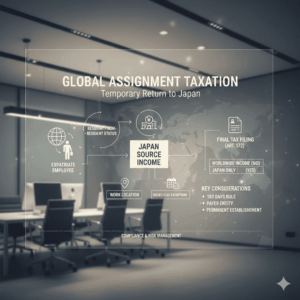Consumption Tax Implications for Services Provided to Non-Residents with Japanese Branches
One key transaction type in international consumption tax handling is the “provision of services to non-residents with Japanese branches” and its consumption tax implications. While this may appear to qualify for export exemption at first glance, under Consumption Tax Law Basic Interpretation 7-2-17, when such non-residents have branches or similar establishments in Japan, the transaction is generally deemed to be conducted through those Japanese establishments, except in certain cases. This means it does not qualify for export exemption and is subject to domestic taxation as a domestic transaction.
Basic Principles of Export Exemption under Consumption Tax Law
Consumption tax is levied on domestic consumption in Japan. Therefore, even in transactions with Japan, goods and services consumed outside Japan are exempt from consumption tax based on the consumption-location taxation principle. This is the export exemption system.
Article 7, Paragraph 1 of the Consumption Tax Law provides exemptions for certain transactions including export transactions, playing a crucial role in preventing international double taxation and maintaining the international competitiveness of Japanese companies. Specifically, services provided to non-residents also qualify for export exemption when certain conditions are met.
However, these “certain conditions” are the core focus of today’s topic. Simply being a non-resident counterparty does not automatically qualify for exemption; careful consideration of the actual service consumption location and transaction substance is required.
Definition of Non-Residents and Export Exemption Application Requirements
Under the Consumption Tax Law, non-residents refer to individuals or corporations that do not have addresses, offices, or similar establishments in Japan. This refers to non-residents as defined under the Foreign Exchange and Foreign Trade Act.
Services provided to non-residents qualify for export exemption because such services are ultimately enjoyed outside Japan and are considered not to directly affect domestic consumption activities in Japan. Typical examples include consulting services and technical guidance provided to overseas companies.
However, even services provided to non-residents that are directly enjoyed domestically (such as domestic dining and accommodation services or domestic real estate management) are excluded from exemption. This is a commonly misunderstood point in practice.
Key Provisions of Consumption Tax Law Basic Interpretation 7-2-17
Here comes the most critical point of this article. Consumption Tax Law Basic Interpretation 7-2-17 establishes special treatment when non-residents have branches or similar establishments in Japan.
Specifically, it stipulates that “even when providing services to non-residents, if the non-resident has branches or similar establishments domestically, the provision of such services shall be deemed to be conducted through those branches or establishments.” This means that even if the formal contract counterparty is an overseas head office, except in certain cases, it is substantially judged as service provision through the Japanese branch.
Through this “deemed provision,” even if the contractual counterparty is an overseas head office, the service is deemed to be provided through the Japanese branch, excluding it from export exemption. This represents a judgment criterion that emphasizes economic substance.
| Transaction Pattern | Contract Counterparty | Consumption Tax Treatment | Legal Basis |
|---|---|---|---|
| Services to foreign companies without Japanese branches | Overseas head office | Generally export exempt | Consumption Tax Law Enforcement Order Article 6 |
| Services to foreign companies with Japanese branches | Overseas head office | Generally domestic transaction (taxable) | Consumption Tax Law Basic Interpretation 7-2-17 |
| Direct contracts with Japanese branches | Japanese branch | Domestic transaction (taxable) | Basic Consumption Tax Law principles |
Consumption Tax Law Basic Interpretation 7-2-17: Service Provision to Non-Residents with Domestic Branches (Partial Extract, Edited)
When a business operator provides services to a non-resident who has branches, liaison offices, or similar establishments domestically, such service provision shall be treated as if conducted through those branches or liaison offices, and the provisions of Consumption Tax Law Enforcement Order Article 17, Paragraph 2, Item 7 “Service Provision to Non-Residents” shall not apply.
However, even for service provision to non-residents with domestic branches or liaison offices, when all of the following requirements are met, it may be treated as service provision under Consumption Tax Law Enforcement Order Article 17, Paragraph 2, Item 7 “Service Provision to Non-Residents.”
(1) The service provision is a direct transaction with the non-resident’s overseas head office, and the non-resident’s domestic branches or liaison offices are not involved directly or indirectly in this service provision.
(2) The business of the non-resident’s domestic branches or liaison offices is not the same type as, or related to, the business pertaining to the service provision in question.
Common Practical Determination Cases and Countermeasures
In actual tax processing, determination in the following types of cases becomes important. First, consider a case where a US corporation has established a Japanese branch in Tokyo, and consulting services are provided under contract with the US corporation’s head office.
In this case, while the contractual counterparty is the “US corporation head office,” if the actual service content relates to business improvement for the Japanese branch, under Consumption Tax Law Basic Interpretation 7-2-17, it is “deemed to be conducted through the branch” and consumption tax is levied as a domestic transaction.
The key determination point is where the substantial beneficiary and consumption location of the service are located. If the service relates to Japanese branch operations, regardless of formal contractual relationships, it is substantially judged as domestic consumption.
Clear Distinction Criteria Between Domestic and Export Transactions
Under the Consumption Tax Law, distinguishing whether a transaction is domestic or export is extremely important in determining consumption tax taxation or exemption. This distinction is judged by comprehensively considering factors such as the transaction counterparty, service provision location, and consumption location.
For transactions with non-residents having branches, the substantial nature of the transaction is emphasized rather than formal contractual relationships. In other words, the judgment criterion is whether the transaction is substantially related to domestic economic activities.
Based on this criterion, even services provided to the same non-resident can have significantly different tax treatments depending on the presence or absence of branches. In tax audits, this substantial determination is also an important checkpoint, making proper preservation of supporting documents necessary.
Frequently Asked Questions and Practical Considerations
Q: Even for services provided to Japanese branches, wouldn’t export exemption apply if the contract is concluded with the head office?
A: No, it generally would not. Under Consumption Tax Law Basic Interpretation 7-2-17, the substantial beneficiary of the service is deemed to be the Japanese branch, and regardless of contract formalities, it is generally treated as a domestic transaction (subject to consumption tax). Export exemption applies only in limited cases where there is a direct contract with the overseas head office and the business content is unrelated to the domestic branch’s business activities.
Q: For foreign companies with branches, is there possibility for export exemption if services relate only to head office operations?
A: In practice, since it is often deemed to be conducted through the branch, the possibility of export exemption application is generally low. Proving this is extremely difficult. Clear evidence must be provided that the service relates purely to overseas head office operations only and is completely unrelated to the Japanese branch.
As a practical consideration, it is important to clearly describe service content and beneficiaries in contracts and maintain consistency in invoices and business reports.
Conclusion
Consumption Tax Law Basic Interpretation 7-2-17 is an important interpretation for ensuring proper consumption tax assessment in international transactions. Service provision to non-residents with branches or similar establishments in Japan is generally deemed to be service provision through domestic branches, so export exemption provisions do not apply, and it is often considered a taxable transaction subject to consumption tax (10%).










